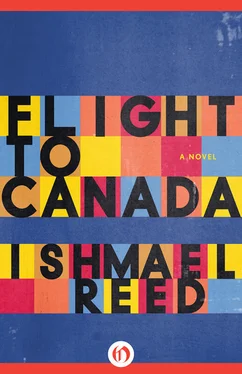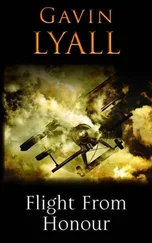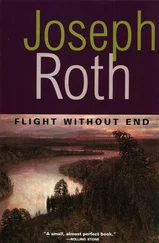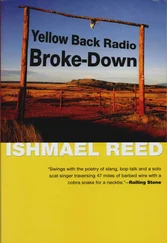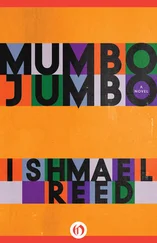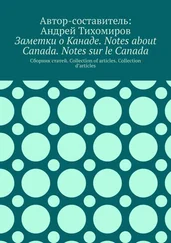“Is it autobiographical?” the medium one asked Quick-skill.
“I’m afraid it isn’t,” Quickskill answered.
“See, I told you. They have poetic abilities, just like us. They’re not literal-minded, as Mr. Jefferson said. I knew that he couldn’t have possibly managed all of those things. Sneak back to the plantation three or four times. Know about poisons,” the medium one said. “That would have been too complicated for a slave.”
“You see, Mr. Swille, we’re students at a progressive school in Nebraska. We’re just doing this job to pay for tuition in graduate school. We’ve even read your poetry,” said the short one.
“You have?”
“Yes. The Anthology of Ten Slaves, they had it in the anthropology section of the library,” the medium one said.
“I’m a Whitman man, myself,” the short one said.
“Really?” Quickskill said. “Isn’t it strange? Whitman desires to fuse with Nature, and here I am, involuntarily, the comrade of the inanimate, but not by choice.”
“I don’t understand,” they said together.
“I am property. I am a thing. I am in the same species as any other kind of property. We form a class, a family of things. This long black deacon’s bench decorated with painted white roses I’m sitting on is worth more than me — five hundred dollars. Superior to me.”
“Fine thought. Fine thought. You see, I told you they can think in the abstract,” the short one said.
They were looking at the painting on the wall. Abraham Lincoln, armed with a gun swab, fighting the dragon of rebellion who has the face of a pig. A short pipe-smoking man has chained Abe’s leg to the tree of “constitutionality” and “democracy.” Lincoln became dictator after Fort Sumter. Told Congress not to return to Washington until the Fourth of July.
“Excuse me, I forgot the vitamin C,” Quickskill said.
“Of course,” the short one said. “Thanks for remembering.”
They picked up a copy of a first edition of Harriet Beecher Stowe’s Uncle Tom’s Cabin. As Quickskill walked into the bathroom, he heard the short one say, “I hear she made a pile on this book.”
Quickskill, the property, moved past the bowl, the sink, and to the window. He opened it quietly. He climbed out and jumped, landing on the ground of an alley. He went by the open window, ducking. The men could be seen talking. He started to run. It was easy for him to run, and he was fast. He had burned the fat from his waist running through the streets of Emancipation City. Nebraskaites. Nice, clean-cut killers. Human being-burglars. Manhandlers. Always putting the sack on things. Putting anacondas in the Amazon in a sack. Trapping a jaguar with dogs, then lassoing the jaguar from above, lifting the jaguar, then lowering the jaguar into a net. Sacking things. Jump on the armadillo from a horse and sack the armadillo. Well, they aren’t going to sack me, Quickskill thought. Nebraskaites. Now he understood Elymas Payson Rogers’ poem:
But all the blind Nebraskaites
Who have invaded human rights,
Will at the North in every case
Be overwhelmed in deep disgrace.
When their eventful life is o’er,
No one their loss will much deplore;
And when their kindred call their name,
Their cheeks will mantle o’er with shame;
But soon their names will be forgot,
The memory of them all shall rot.
And let their burying places be
Upon the coast beside the sea;
And let the ever-rolling surge
Perform a constant funeral dirge.
And when the stranger shall demand
Why these are buried in the sand,
Let him be told without disguise:
They trod upon the Compromise.
THE SLAVE HOLE CAFé is where the “community” in Emancipation City hangs out. The wallpaper shows a map of the heavens. Prominent is the North Star. A slave with rucksack is pointing it out to his dog. The café is furnished with tables, chairs, sofas, from different periods. There are quite a few captain’s chairs, deacon’s benches. There are posters and paintings and framed programs: Our American Cousin, a play by Tom Tyler; a photo of Lincoln boarding a train on the way back to Washington from a trip to Emancipation. Sawdust on the floor. A barrel of dill pickles. Above the long bar is a sign: PABST BLUE RIBBON. Corn-row and nappy-haired field slaves are here as well as a quadroon or two. Carpetbaggers, Abolitionists, Secessionists, or “Seceshes,” as they are called, even some Copperheads. The secret society known as the “Rattlesnake” order meets here. They advertise their meetings in the Emancipation newspaper: “Attention, Rattlesnakes, come out of your holes … by order of President Grand Rattle. Poison Fang, Secretary.”
Confederate sympathizers go to places named the Alabama Club, but some come here, too. They’ve been known to smash a bottle after a slave has drunk from it. Ducktail hairdos go here. Crossbars of the Confederate fly from pickup trucks.
Quickskill ran into the Slave Hole out of breath, went to a table where he saw Leechfield’s Indentured Servant friend, the Immigrant, Mel Leer. Well, he wasn’t indentured any more. He had served his contract and was now at liberty. He and Leechfield were inseparable. When he plopped into the chair the Immigrant rustled his newspaper in annoyance. His hair was wild, uncombed black curls, and he kept brushing some away from the left side of his forehead. He had an intense look, like Yul Brynner, wore long flowing ties and velvet suits and some kind of European shoes. Lace cuffs. Jewelry.
“Man, two guys just tried to confiscate me. Put a claim check on me just like I was somebody’s will-call or something,” panted Quickskill.
“Kvetch! Always kvetch!”
“What do you mean kvetch? If I hadn’t run away, I’d be in a van on the way back to Virginia.”
The waitress brought him a frosty mug of beer like the kind they feature at Sam’s Chinese restaurant on Yonge Street in Toronto.
The Immigrant looked at him. “Your people think that you corner the market on the business of atrocity. My relatives were dragged through the streets of St. Petersburg, weren’t permitted to go to school in Moscow, were pogrommed in Poland. There were taxes on our synagogues and even on our meat. We were forbidden to trade on Sundays and weren’t allowed to participate in agriculture. They forced us into baptism against our wishes. Hooligans were allowed to attack us with weapons, and the police just stood there, laughing. Your people haven’t suffered that much. I can prove it, statistically.”
“Oh yeah? Nobody’s stoning you in the streets here. You are doing quite well, hanging in cafés, going to parties with Leechfield. And you have a nice place to live. What are you bitchin about? All you and Leechfield seem to do is party and eat ice cream topped with crème de menthe.”
“There are more types of slavery than merely material slavery. There’s a cultural slavery. I have to wait as long as two weeks sometimes before I can get a Review of Books from New York. This America, it has no salvation. Did you see what happened in those battles? At Bull Run? They were like picnics attended by the rich. Cowboyland. Look at this filth …” It was a copy of Life magazine; a photo of the carnage at Gettysburg. “Filth! Obscene! Disgusting! Just as this country is. Why, during the whole time I’ve been in this town, I haven’t seen one person reading Dostoevsky. Your people! Requesting wages and leaving their plantations. They should pay for themselves. Look at us. We were responsible. We paid for ourselves. Paid our way. I earned myself! We never sassed the master, and when we were punished we always admitted that we were in the wrong. The whole world, sometimes, seems to be against us. Always passing resolutions against us. Hissing us. Nobody has suffered as much as we have.”
Читать дальше
